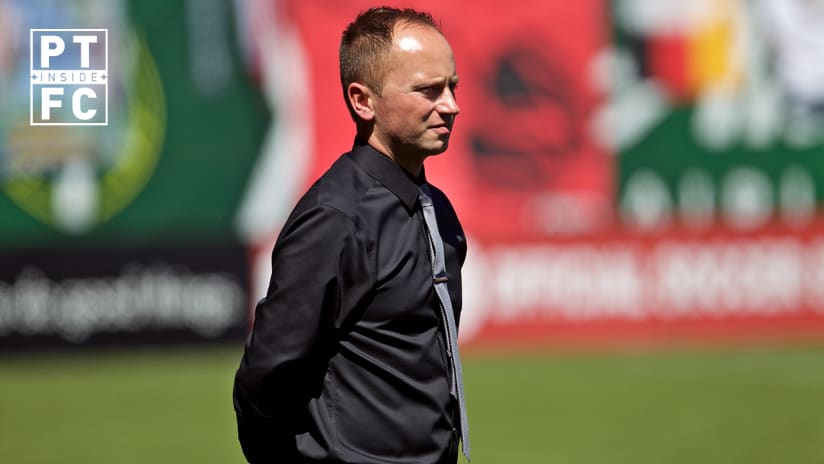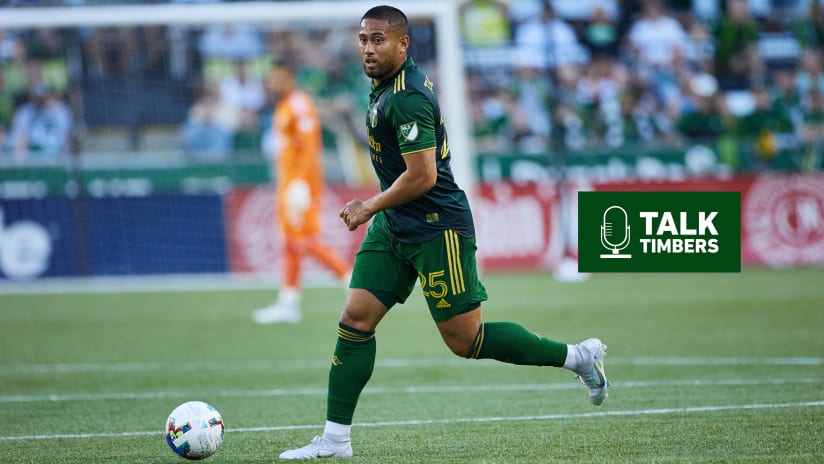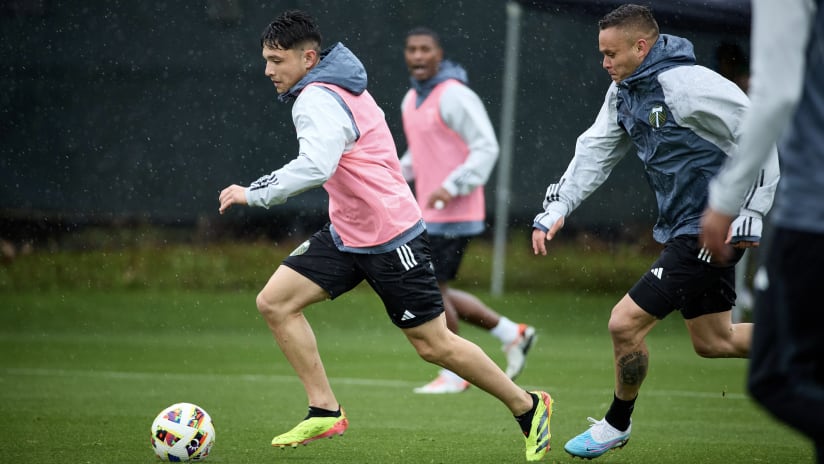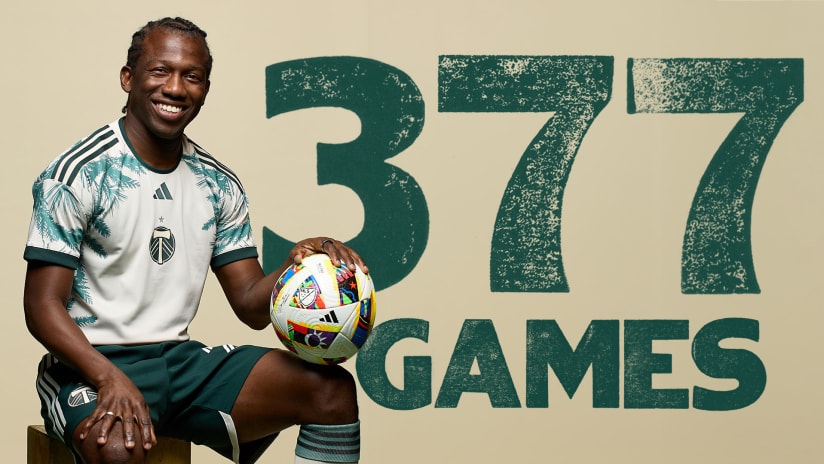Editor's Note: Inside PTFC is a new weekly column – one each for the Portland Timbers and Thorns FC – from soccer writer Richard Farley that dives deeper into the recent successes and challenges each team has been facing. Tactical looks, statistical analysis, rising players and more, Inside PTFC aims to give a closer look into the two teams.
PORTLAND, Ore. – For the second time this year, Portland fans are dealing with a five-game winless streak, only when it happened on the men’s side, the slump was a little more explicable. Perhaps nobody picked the Timbers to close their first six weeks winless, but with a new coaching staff, significant squad changes, and five games away from home, there were reasons why the team got off to a 0-3-2 start.
What’s happening with the Thorns, right now, is far less explicable, partially because the issues are so nuanced. Whereas the Timbers had a bellwether result against the New York Red Bulls that sounded alarms, the Thorns have three draws in five, have generally created better chances than their opponents, and have only been outscored by two goals over these last 450 minutes.
Date |
Opponent |
Result |
Shots |
Shots on Target |
Shots in Penalty Area |
Successful Passes |
Passes into Attacking Third |
|---|---|---|---|---|---|---|---|
April 20 |
Washington |
1-1 |
12-13 |
6-5 |
9-7 |
303-230 |
42-50 |
April 28 |
at Utah |
1-1 |
11-5 |
3-1 |
8-3 |
302-287 |
56-61 |
May 5 |
Seattle |
2-3 |
24-12 |
11-8 |
21-8 |
274-209 |
59-49 |
May 9 |
at Houston |
1-1 |
11-10 |
4-6 |
6-6 |
446-156 |
91-42 |
May 11 |
Orlando |
1-2 |
24-13 |
6-7 |
13-7 |
243-191 |
62-60 |
Average |
1.2-1.6 |
16.4-10.6 |
6.0-5.4 |
11.4-6.2 |
313.6-214.6 |
62.55 |
“I think it’s past that,” Thorns head coach Mark Parsons said, after Orlando, when asked about his team’s defensive breakdowns. “It’s hard to dwell on that. The rest of the game, we were really good for periods, and we weren’t good for others.”
It’s a quote that could be applied to any result in this stretch. In individual games, and in isolated facets, the Thorns could be playing better. But there are no bad games, here. There are no inept offensive performances. Perhaps you’d like the ratio of penalty-area shots to shots on target to be better, but generally, the Thorns aren’t playing badly, particularly when compared to their opponents. The attacking numbers are good. The defensive numbers are fine. The team’s just getting poor results.
In the standings, that distinction doesn’t matter, but when it comes to identifying, training for, and correcting the team’s problems, it means everything. As a coach, there are only so many times you can tell a squad that the results need to be better. Beyond bottom lines, staffs have to provide solutions, and when you spend weeks upon weeks focusing on process – how your team goes about producing its outcomes – you can’t change your worldview because of a poor run of results.
Looking toward their goal
Where Portland need solutions may seem obvious while watching their games, but it helps to look at both sides of the field, especially given the Thorns’ attacking talent. All of those underlying indicators, above, say Portland’s attack is doing quite well. At least, when you look beyond the variance of 90-minute sample, the Thorns’ indicators look strong.
But then there’s the bottom line. While many teams would be happy for their slumps to produce 1.2 goals per game, over the last five outings, those six goals haven’t been enough. And ultimately, if you’re not outscoring your opponents, you’re not producing enough goals.
Even so, the solution here seems to be time. And patience. Since we wrote in glowing (and premature) terms about the team’s high-octane, small-sample production, the Thorns have only scored twice in 180 minutes. But there are a number of reasons to believe the attack has been better than those outcomes. Midweek trips to Houston – playing on short rest in effort-sapping heat – will always produce asterisk-laden results, while the Orlando match saw a number of good chances that didn’t end up on the scoresheet.
Mallory Weber’s disallowed goal. Midge Purce’s, too. Andressinha with an open look from just beyond the box. Ashlyn Harris’ great save on Tobin Heath’s second-half bender. These are all high-level chances, ones the team would be happy to create. That they didn’t end up on the scoresheet is frustrating, but two of them actually ended up in the net. How do you ask your team to do more when the whistles are beyond your control?
The defensive end of the field
The view at the other end of the park is far different. We’ve talked about it before, in discussing the scope of the Thorns’ defensive issues. After the game against Seattle, we leaned on the same refrains: the issues aren’t systemic; the mistakes aren’t being repeated; the problems need to be solved, but the solutions don’t need to be huge.
Three weeks later, here we, in the exact same place, looking back at a game – the Thorns lost 3-2 to Orlando Pride last Saturday – where all the goals were both preventable and aberrational. When aberration becomes a pattern, though, is “aberration” the right word, anymore?
Consider the eight goals the team has allowed during their five-game winless run. Have any of the problems been repeated, indicated a chronic issue that opponents can exploit? At underlying levels, there are a few concerns. The finishes on the Houston goal and the first against Orlando are from similar areas, and the first goal against Seattle matches the one given up to the Spirit as issues in the six-yard box. But the similarities aren’t enough to identify general problems, train specific solutions, and expect new results.
Goal No. |
Date |
Opponent |
Scorer |
How |
|---|---|---|---|---|
1 |
April 20 |
Washington |
Francisca Ordega |
Collision in Thorns' six-yard box |
2 |
April 28 |
Utah |
Amy Rodriguez |
Giveaway in possession near defensive third, while in attacking shape |
3 |
May 5 |
Seattle |
Beverly Yanez |
Scorer from corner between defenders in zone at edge of six-yard box |
4 |
May 5 |
Seattle |
Jodie Taylor |
Penalty kick converted after foul just inside 18-yard box |
5 |
May 5 |
Seattle |
Rumi Utsugi |
Long-distance from corner played beyond 18-yard box |
6 |
May 9 |
Houston |
Kyah Simon |
Midfield giveaway in attacking shape leads to transition goal |
7 |
May 12 |
Orlando |
Alex Morgan |
Cross from left goes through box, isn't cleared beyond far post |
8 |
May 12 |
Orlando |
Christine Nairn |
Failed clearance leads to goal from beyond penalty box |
Think of this from a coaching staff’s point of view. You’re go into a week trying to fix your problems and figure out how to attack your opponent. When you break down the previous week’s film, looking for problems errors, but from Saturday’s game against Orlando, what do you come up with?
“Remember to clear the ball?” “Don’t head it to an opponent?” There is more to Orlando’s goals than those elements, but as it concerns a coaching staff’s process, the evaluation remains the same: What from those moments (and there were more moments than just the goals allowed) can we pull out, train, and improve upon going forward?
Over the last five games, most of the Thorns’ mistakes have been so random, it would be a waste of training to devote much time to the solutions. And at this point in their careers, professional players don’t need coaches harping on them about the obvious. They know when the basics been to be should be done, and they’re just as upset as their coaches when mistakes happen on the field.
Maintaining room to improve
That kind of harping would also risk the worst-case scenario, here: creating a negative environment. Thorns players have been through enough to know five-straight losses are bad, and the bottom-line results aren’t acceptable. Coaches need to acknowledge the situation – maybe even get mad, at some point – but they can’t push the positive out of the room. The team’s culture can’t be defined by fear of the next mistake. It has to be about working toward the next triumph.
Perhaps that’s why Parsons took a more reflective approach after the loss to Orlando. We used this quote on Saturday, but it bears repeating, as it reflects the psychological balance he has to preserve.
“When uncharacteristic things happen, is it fatigue, is it mental fatigue, is it just needing a break?” he asked. Rather than for probe answers then, on the field after the match, he proposed a more holistic solution.
“The best thing we can do right now is just let this amazing group take a breather and really, really recharge,” he said. “Not a single player is taking a break from giving to this team, and maybe the energy that they’re giving is wearing them thin. Recharge, let this great group of players take their minds off things for two days, and then build up and continue tweaking, continue to find ways to get marginal gains, and step forward.”
As much as addressing the technical and mental problems we see between the lines, this will be Parsons’ greatest challenge – maintaining the mentality of the group. How do you correct course without undermining what you’ve built? How do you solve problems without creating new ones? And how do address a five-match skid without letting that skid define your squad?














